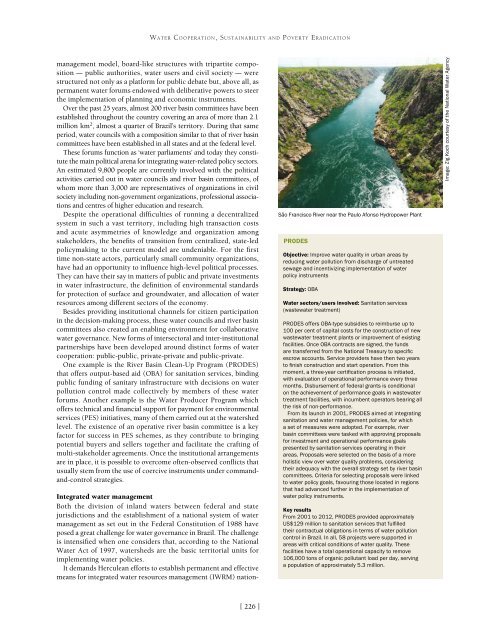222893e
222893e
222893e
Create successful ePaper yourself
Turn your PDF publications into a flip-book with our unique Google optimized e-Paper software.
WATER COOPERATION, SUSTAINABILITY AND POVERTY ERADICATIONmanagement model, board-like structures with tripartite composition– public authorities, water users and civil society – werestructured not only as a platform for public debate but, above all, aspermanent water forums endowed with deliberative powers to steerthe implementation of planning and economic instruments.Over the past 25 years, almost 200 river basin committees have beenestablished throughout the country covering an area of more than 2.1million km 2 , almost a quarter of Brazil’s territory. During that sameperiod, water councils with a composition similar to that of river basincommittees have been established in all states and at the federal level.These forums function as ‘water parliaments’ and today they constitutethe main political arena for integrating water-related policy sectors.An estimated 9,800 people are currently involved with the politicalactivities carried out in water councils and river basin committees, ofwhom more than 3,000 are representatives of organizations in civilsociety including non-government organizations, professional associationsand centres of higher education and research.Despite the operational difficulties of running a decentralizedsystem in such a vast territory, including high transaction costsand acute asymmetries of knowledge and organization amongstakeholders, the benefits of transition from centralized, state-ledpolicymaking to the current model are undeniable. For the firsttime non-state actors, particularly small community organizations,have had an opportunity to influence high-level political processes.They can have their say in matters of public and private investmentsin water infrastructure, the definition of environmental standardsfor protection of surface and groundwater, and allocation of waterresources among different sectors of the economy.Besides providing institutional channels for citizen participationin the decision-making process, these water councils and river basincommittees also created an enabling environment for collaborativewater governance. New forms of intersectoral and inter-institutionalpartnerships have been developed around distinct forms of watercooperation: public-public, private-private and public-private.One example is the River Basin Clean-Up Program (PRODES)that offers output-based aid (OBA) for sanitation services, bindingpublic funding of sanitary infrastructure with decisions on waterpollution control made collectively by members of these waterforums. Another example is the Water Producer Program whichoffers technical and financial support for payment for environmentalservices (PES) initiatives, many of them carried out at the watershedlevel. The existence of an operative river basin committee is a keyfactor for success in PES schemes, as they contribute to bringingpotential buyers and sellers together and facilitate the crafting ofmulti-stakeholder agreements. Once the institutional arrangementsare in place, it is possible to overcome often-observed conflicts thatusually stem from the use of coercive instruments under commandand-controlstrategies.Integrated water managementBoth the division of inland waters between federal and statejurisdictions and the establishment of a national system of watermanagement as set out in the Federal Constitution of 1988 haveposed a great challenge for water governance in Brazil. The challengeis intensified when one considers that, according to the NationalWater Act of 1997, watersheds are the basic territorial units forimplementing water policies.It demands Herculean efforts to establish permanent and effectivemeans for integrated water resources management (IWRM) nation-São Francisco River near the Paulo Afonso Hydropower PlantPRODESObjective: Improve water quality in urban areas byreducing water pollution from discharge of untreatedsewage and incentivizing implementation of waterpolicy instrumentsStrategy: OBAWater sectors/users involved: Sanitation services(wastewater treatment)PRODES offers OBA-type subsidies to reimburse up to100 per cent of capital costs for the construction of newwastewater treatment plants or improvement of existingfacilities. Once OBA contracts are signed, the fundsare transferred from the National Treasury to specificescrow accounts. Service providers have then two yearsto finish construction and start operation. From thismoment, a three-year certification process is initiated,with evaluation of operational performance every threemonths. Disbursement of federal grants is conditionalon the achievement of performance goals in wastewatertreatment facilities, with incumbent operators bearing allthe risk of non-performance.From its launch in 2001, PRODES aimed at integratingsanitation and water management policies, for whicha set of measures were adopted. For example, riverbasin committees were tasked with approving proposalsfor investment and operational performance goalspresented by sanitation services operating in theirareas. Proposals were selected on the basis of a moreholistic view over water quality problems, consideringtheir adequacy with the overall strategy set by river basincommittees. Criteria for selecting proposals were linkedto water policy goals, favouring those located in regionsthat had advanced further in the implementation ofwater policy instruments.Key resultsFrom 2001 to 2012, PRODES provided approximatelyUS$129 million to sanitation services that fulfilledtheir contractual obligations in terms of water pollutioncontrol in Brazil. In all, 58 projects were supported inareas with critical conditions of water quality. Thesefacilities have a total operational capacity to remove106,000 tons of organic pollutant load per day, servinga population of approximately 5.3 million.Image: Zig Koch courtesy of the National Water Agency[ 226 ]


